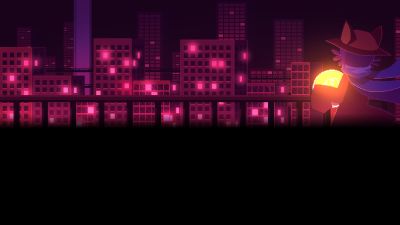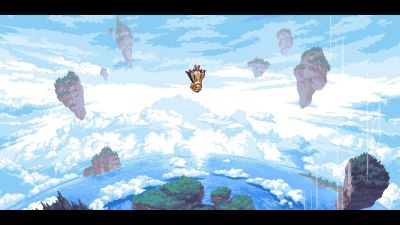Steam catchup

I had planned on playing these games over the holiday, but technical difficulties and social obligations got in the way. Ah well.
OneShot feels like it’s the game that inspired Undertale at first, what with its rpgmaker origins and fourth-wall-breaking metanarrative, but that’s about where the similarities end. Where Undertale is a – at least in form – traditional JRPG where the backstory is still central and enemy encounters are random (albeit bullet hell avoidance fights instead of turn-based stat management), OneShot is a more traditional puzzle game and the metanarrative is the backstory. It’s clever and heartwarming in its own way.
Orwell probably has more in common with a swath of games I have not played, but it felt like a combination of Ace Attorney and Her Story to me. It’s neat, kind of clever and with an intriguing mystery – although I can’t shake the feeling that it would have been so much better if the central concept of the story had been more believable. It also forces your hand a bit too much to leave any lasting impression, but it has a lot of heart and well-written characters.
Fossil Echo is mostly a precision platformer. Not a spectacular precision platformer – It doesn’t have a very high skill ceiling and doesn’t leave a lot of room for creativity – but a competent one with solid controls and a nice presentation. It is short, a couple of hours at most, but it gets done what it is trying to do without getting repetitive.
Four Sided Fantasy is about as long as Fossil Echo but a puzzle-platformer rather than a reflex challenge. It’s pretty and has a few interesting puzzles, although it doesn’t go too deep into any of its mechanics. Still, it is very pleasurable to play and I can certainly respect going for a shorter game when the cool thing you’re trying to do does not require more.
Owlboy

I first heard about Owlboy back in 2008 – indie gaming had been buzzing loudly for a few years and was just about to hit the mainstream, as such a number of hopeful developers – some who would go on to make it big, some who had already done so – hung out over at the tigforums which is where Snake posted the first pictures of the game-to-be. While this makes for an excellent excuse for parading my indie cred it also serves to highlight the kind of culture Owlboy came from – back then, Steam was a pipe dream for most developers and XNA seemed like the most promising development platform. There wasn’t a lot of games like Owlboy around, and the ones that were competed on production quality.
Owlboy feels like a game that came from that time in many ways. The audiovisual presentation of the game is sublime, and even though pixelart has had at least one original period and a couple of revivals at this point there are few games that utilize it with the mastery Snake brings to Owlboy. The music is great as well, the main theme tying together a large number of tracks that are excellent on their own.
Design-wise, Owlboy occasionally struggles with its legacy. In its effort to show off the large beautiful environments Owlboy can sometimes feel very empty of things to do, and some of the gameplay obstacles take a little longer to push through than what feels convenient. The higher-level systems work flawlessly and the controls are usually free from issues, but you will occasionally hit edge cases where the scope and origins of this project make themselves known. Difficulty curve varies wildly from room to room, and checkpoints are sometimes not as frequent as you might want them to be. Owlboy is a traditional platform game with some insightful design innovations and even more flaws – some which stem directly from the last decade.
It is worth playing for the art and music alone, but it is also an interesting case study of what happens when a development cycle spans eight years, from the middle of one console generation to the next one.
Wayward
I mentioned last year that 2015 had been rough, this was mostly for professional reasons that I cannot really talk about. Similarly, 2016 has had its fair share of triumphs but overall it’s been very rough – this time for personal reasons that I am not going to go talk about. The uncertainty and change of the industry I am in can be stressful in times like these, but at least I can appreciate that we are constantly delivered new experiences.
One thing that was positive though – we got more work done on Backworlds than we had during either 2014 or 2015 and we’ve set a good pace that make it a joy to work on even through the tough parts. And it doesn’t look like it will be slowing down soon, either, so that’s good. It feels comforting to know that even after so many long hours in the games industry, I can still make and play games just to relax. Speaking of which…
the Witness was a game with many more secrets than I could dive into, but it had a sublime purity of design to it coupled with masterful audiovisual presentation that made it one of the most fulfilling games I have played in a very long time.
Doom dared to be a game from an older time, a game with older values, but without turning itself into a gag. It didn’t quite have the over-the-top setpieces or outrageous weapons of Bulletstorm, but it was a more finely tuned game with bold ideas that came together to form an experience that was greater than the sum of its parts.
Rakuen is a memorable experience that starts slow and shallow – trite, almost – but slowly grows its narrative into something more complex and deeply moving. While it can take a while to let it build the mood it needs, it is a game that exists for its payoff.